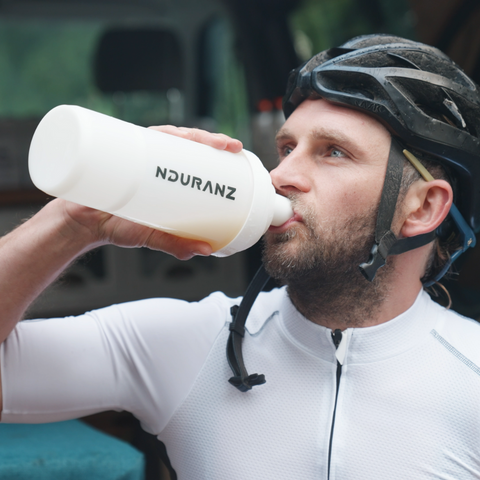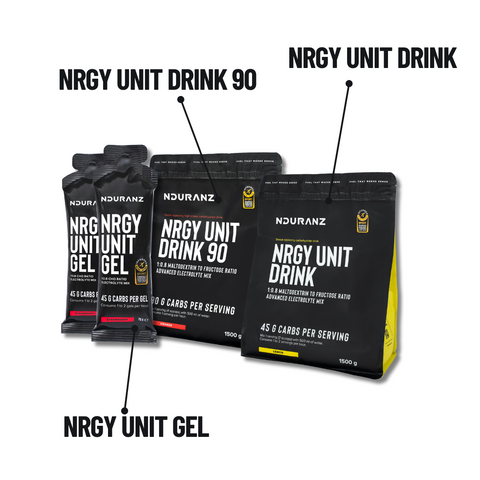We sat down with Dr. Tim Podlogar to discuss sports nutrition in professional cycling.
Tim, what is the average diet of a professional cyclist at the Giro?
The most important is breakfast, which is based on carbohydrates. Since the race only begins at later in the morning, we must take care of protein, so the breakfast is balanced with all the nutrients. Three weeks is not the same as a one-day race.
During the race itself, the intake of carbohydrates is very high. We're not talking about 40 to 60 grams per hour but more. Most teams these days try to reach 120 grams per hour. They want to minimize muscle damage in every stage and allow the athletes to have enough energy when they reach the goal.
At the finish line, they immediately get a drink with carbohydrates and protein. That is followed by smaller meals, maybe some Haribo gummies or something prepared by the cooks during breakfast. In the evening, they also have dinner, which is the largest meal after breakfast.
During the race, they mostly consume dietary supplements, right?
Yes, energy gels, energy bars, a combination of solid foods and energy gels or sports drinks. It depends on what a cyclist prefers.
Basically, we are talking about a daily intake of 5000 to 6000 calories, mainly from carbohydrates.
45 g CHO per gel with electrolytes
45 g CHO, 65 or 130 mg caffeine per gel
22.5 g CHO per gel
High-performance gummy bar












And Coca Cola or Fanta for recovery?
It's best to avoid that, as the first meal should also contain protein.
But it is not really problematic. Both drinks contain regular sugar, which is optimal in time of recovery. The only thing missing is protein. Many cycling teams use sweet drinks. For example, Tadej Pogačar loves Fanta.
So you are in favor of sweet drinks like Coca Cola? What do you think about Cristiano Ronaldo turning it down theatrically at the press conference?
I think Coca Cola is a good thing. It contains sugar and after an exhausting stage, this is the essential thing an athlete must get.
But professional athletes, same as normal people, have their own ideas about nutrition based on stuff they read on their social media, which has nothing to do with science.
How long could you maintain a competitive pace with proper nutrition?
A lot depends on the individual. The difference between a cyclist who wins one race and the one who wins for three weeks in a row is their ability to recover.
We could push longer, but the performance would start to decline. If you participate at three 3-week races in a season, you can't be optimally prepared for all of them, even if you have a month's rest. It is clear that one such race drains you for a long time.
To perserve your long-term health and athletic performance, you should learn how to manage stress.
Why?
Such efforts lead to a hormonal imbalance. You ingest 80 to 100 grams of carbohydrates per hour, but this is still a small part of what you burn. The body is in a catabolic phase for a very long time, 5 to 6 hours every day. This is unsustainable long-term.
Even if you do everything correctly, you can't recover. Glycogen takes 24 hours to replenish, but here you never have 24 hours between the stages. This is why it is difficult to recover properly every day.
What would you recommend nutrition-wise to a serious amateur athlete?
One thing is nutrition for regular training and another is nutrition for a training camp, as for most amateurs, training camps are like stage races for the pros.
During a training camp, everything revolves around carbohydrates. Keep it as simple as possible, no point in losing energy selecting healthy meals. Haribo gummies will do just fine.
 Haribo gummies are Dr. Tim Podlogar's secret weapon.
Haribo gummies are Dr. Tim Podlogar's secret weapon.
Nutrition for regular training is all about managing the intake of macronutrients. It must contain enough protein, carbohydrates, and not too many fats.
Only then we can start looking at the quality of food, how natural it is. Gluten or gluten free pasta? More vegetables, slow carbs, fast carbs? These are the final touches that more often than not do not improve your performance, but they do make you lose a lot of time.
Fundamentally, the most important thing is the energy availability. If this is taken care of, the training performance will be good.
In the worst case, we start meddling with supplements, such as magnesium and vitamins, but forget about the importance of macro nutrients. Without energy we can't function properly, regardless of how many vegetables and other supplements we eat.
Vitamins, minerals, adaptogens
Complete daily intake
Anti-inflammation, immunity support
Complete vitamin B formula









How much do we have to complicate regarding carbohydrates in terms of the glucose to fructose ratio and the different transporters of carbohydrates in the intestine? Do we waste everything we consume over 60 grams of glucose per hour?
Professionals also eat glucose-based carbohydrates at higher intake rates. But their energy demands are vastly different to what amateurs need. I am pretty sure more glucose can be used than just 60 grams per hour provided that there is a demand for it. So yes, we often go higher than 60 grams per hour.
In an ideal world, we'd always be using the perfect ratio, but this is not always possible.
What is the difference between one large and more smaller meals in the recovery?
The most important thing is that after each training session the athlete gets protein and carbohydrates to initiate the recovery process. After that, it doesn't really matter whether they have two large meals or several smaller ones. It won't make much of a difference.
You should know that if carbohydrates have limited absorption, and you eat a large meal, it will simply take longer to digest. There is no other difference. In the end, everything will end up in your blood stream.
What about protein?
Protein is more complicated. But let's not get too geeky today.
You are not a fan of soy, are you?
I am not a fan of plant sources of protein because they don't have a complete amino acid profile.
It is possible to create a quality meal out of plant sources of protein, but you need to put more thought into it.
Some people say there are vegan athletes who are successful. That is true, but you need to be extra careful how you plan your diet to get all the necessary nutrients. If you eat animal-based food, there is a much smaller chance of making mistakes.
How do you think sports nutrition evolved in the recent years?
If we look at the times of Lance Armstrong, the period between 2000 and 2007, everything was based on doping. Doping was first, training and nutrition accommodated it. Nutrition was at third place.
With the arrival of the cycling team Sky, somewhere around 2010, this changed. At least in my view. They started to pay attention to nutrition in regards to the quantities. They were the first to have a kitchen with them.
Then it all evolved further. Now we have one branch dealing with minerals and vitamins — they believe this is the way to improve performance. The other branch, we are core scientists dealing with macronutrients, the source of energy. We research carbohydrates, individual ratios.
How is Nduranz different from everyone else?
Most brands still don't understand why fructose is useful and in what amount it should be used.
Nduranz may be the first brand that understands this throughout their entire product line and provides to the athlete everything they need. We don't complicate where there is no need to complicate. The emphasis is on macronutrients, not as much on micronutrients. This is the most important part.
 Nduranz is known for its extremely efficient fueling supplements based on modern research and testing.
Nduranz is known for its extremely efficient fueling supplements based on modern research and testing.
Why do you consider micronutrient research to be less important?
The problem of scientists is their reductionist view on science. They only see their problem, what they are researching, but they don't see the big picture.
Instead, they deal with stuff like cellular mechanisms on isolated muscle fibers. It's difficult to apply this knowledge on a living organism in a sports environment.
Can you give us an example of a product in which the research of micronutrients didn't yield results?
A good example is menthol, which was supposed to improve the performance of athletes in hot environments.
The problem was that they always tested menthol against a placebo, namely water. But they didn't consider that an athlete also ingests carbs during an activity.
We were the first to test whether menthol with carbohydrates still has an effect, and we discovered it has no additional effect. Another study conducted later also confirmed this.
Supplements are always studied in isolation, usually in suboptimal conditions or suboptimal comparison groups.
Let's take BCAA as an example — of course they will be better than a placebo because we add something.
You need to see the athlete as a whole. If you were to sum all the promised improvements, 1% from caffeine, 2% from nitrates, etc., you'd have to see a 50% performance improvement, but this never happens.
Do you think there are many misconceptions in the world of sports nutrition?
They are increasing.
Why are they increasing?
Because of the social media. And because of the stories of certain individuals who don't know what this is all about.
These theories more easily reach individuals, even top-level athletes, which is the most problematic part.
You end up having to discuss with top-level athletes whether carbohydrates make you gain weight. You are not an ordinary person who walks 3000 steps per day and that's it. You are someone who needs three to four times more energy than regular people.
Sometimes it is difficult to understand that you must eat more when you are active.
Yeah. A good example, if we take 2000 calories of healthy food, when we have a lot of vegetables and unprocessed foods for lunch and dinner.
This works for someone who doesn't do much throughout the day, but if we apply this to a top-level athlete, who has a three-times higher energy requirement and must eat three-times more food, you'd get a huge amount of food that would be difficult to ingest and too much fiber that the body cannot digest normally.
This is why the nutrition for athletes is not the same as the nutrition for regular people.
Which of these misconceptions are the most dangerous for an athlete?
Surely the one that carbohydrates make you gain weight. This is the biggest misconception. And a problem I have to deal with on a daily basis.
Carbohydrates will not make an athlete gain weight, but they will allow them to train more efficiently. Learn more about the nutritional strategy carb-loading.
Of course, they can gain weight if the amount of carbohydrates they ingest is too high, but this means that the entire energy intake is too high, which includes fat.
Carbohydrates are not problematic. Especially if we meet the daily energy requirements.
The other things is that coaches and athletes believe that we need to lose body mass to become stronger, relatively speaking.
But we see in cyclists, I'm also a good example, if you have a slightly higher body mass as a result of a higher amount of muscle, it makes you stronger and your performance improves, the recovery is better, you are not starving all the time.
Furthermore, if I look at cycling on a flat terrain, it's the absolute watts that count, the absolute production of power, not the relative. Only on elevations the relative becomes important.
So, if you have an athlete who is heavier, but has the same or a slightly lower watt per kilogram output, they will still be better as a wholesome cyclist and will be able to ride with the best, as if you lose your time on flat surfaces, you won't be able to catch up on the elevations.
These are two huge misconceptions that seem impossible to eradicate.
How do you see the future of sports nutrition?
More individualized, dealing with each athlete individually to fully understand and appreciate their nutritional requirements.
VerticalMed Tyrol uses your personal data and blood analysis to create a customized plan for your nutrition, training and supplements.
I'm exploring the idea to adapt the intake of carbohydrates during physical activity to what an athlete actually absorbs and uses, not to have just a general recommendation of 90 grams of carbohydrates per hour for everyone, but to adapt this value to the needs and capabilities of the athlete.
Do you dare to forecast what future research will discover?
Good question. There are still unknowns that we are dealing with.
The next thing to explore is what happens once we move out of the lab.
Currently, all research is done in a lab with 18 degrees C, 30% humidity, and controlled conditions. Things fall apart once we reach extreme conditions, hypoxia, when we enter heat.
We have to do more research to better understand what exactly happens and how to prevent it.
How will sports nutrition brands adapt?
It feels right now everyone is copying from everyone else. They already copied us. I think they've run out of ideas.
But probably sooner or later someone will create a quality product that will set a new standard?
I doubt it. They didn't manage to put into practice the 1:0.8 ratio, which has been known for a decade, and we were the first to do so two years ago.
 Nduranz products are known for their very specific benefits, such as the combination of glucose (maltodextrin) and fructose in a 1:0.8 ratio. Become the master of energy with Nrgy Unit.
Nduranz products are known for their very specific benefits, such as the combination of glucose (maltodextrin) and fructose in a 1:0.8 ratio. Become the master of energy with Nrgy Unit. Why aren't the manufacturers more up-to-date?
Everyone says that science is behind practice. In reality, practice is behind science. This is contrary to what we believe, but not knowing science is problematic.
Science has the answers to the questions asked by coaches and athletes, but they are unable to access this knowledge. And manufacturers often seek solutions in things that may not be important.
They focus on details but neglect the fundamentals. For example, they focus on the type of maltodextrin they put into their product, but they neglect the ratio of maltodextrin and fructose, which is a lot more important than the type of maltodextrin, as there is no research to show that the type of maltodextrin has any influence.
They make empty promises.
So you think that in 2040 things will be relatively the same as today, as far as sports nutrition is concerned?
Yes. I don't see how physiology and insight could change that much. I hope some myths will be broken, but generally, I expect things to stay the same.
Are there any open questions?
Depends on what field someone is from.
Magnesium is definitely a mineral that we don't need during physical activity.
There are other questions. Is fructose healthy or not? Are dairy products healthy or not? Recently I stumbled upon a debate on oatmeal versus rice.
Why most elite athletes eat oats for breakfast? I am of the opinion that oatmeal is not the best option for breakfast when the start of the race is in close proximity to the breakfast because it contains lots of fiber, which can cause digestive issues.
Discover the ideal timing for incorporating dietary fiber into your diet, crucial for optimizing performance.
One of the arguments why oats instead of rice is that oats are healthier. But this leads to the question, what is healthy food?
And if we turn the question around, if we are sick, are we going to get better sooner if we eat oatmeal instead of rice?
No, we won't.
We hear everywhere that fiber is healthy, so maybe we think that food with more fiber is automatically healthier.
Yeah. Again we see people think that what works best for a sedentary person makes sense for an elite athlete on the day of the race. That's not the case.
I have nothing against oats during the week when you do light training or train in the evening, but on race day, oats are out of the question. At least in my opinion.
Is this a consequence of the limited view that we see food as healthy in absolute terms and not as what meets our needs?
Yes. People stuff themselves with healthy fats, gain weight, and think they are healthy. No, you gained weight and you are fat, you're not healthy at all.
Tim, thank you for your time.



Nrgy Gel 45 Box
45 g CHO per gel with electrolytes



Nrgy Gel 45 with Caffeine Box
45 g CHO, 65 or 130 mg caffeine per gel



Nrgy Gel 22.5 Box
22.5 g CHO per gel



Nrgy Chew Bar 22.5 Box
High-performance gummy bar




